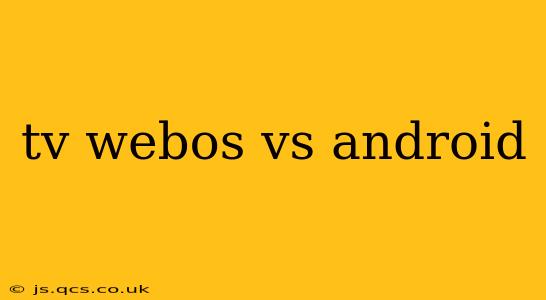Choosing a smart TV can feel overwhelming, with a dizzying array of features and operating systems vying for your attention. Two of the most popular platforms are LG's webOS and Google's Android TV. This in-depth comparison will help you understand the key differences and determine which platform best suits your needs.
What is webOS?
webOS is LG's proprietary smart TV platform, known for its intuitive interface and ease of use. It's designed to be simple and straightforward, making navigation a breeze even for less tech-savvy users. A key feature is its "Magic Remote," which allows for point-and-click navigation and voice control. This significantly simplifies app selection and content browsing.
What is Android TV?
Android TV, powered by Google, offers a vast app ecosystem and extensive content integration. It boasts a massive library of apps, including streaming services, games, and more, far exceeding what's available on webOS. Its integration with Google Assistant allows for hands-free voice control, making it incredibly convenient for searching for content and controlling other smart home devices.
webOS vs. Android TV: A Head-to-Head Comparison
Here's a breakdown of the key features and differences between webOS and Android TV:
User Interface and Navigation
- webOS: Clean, simple, and user-friendly. The Magic Remote enhances navigation significantly. The minimalist design avoids feeling cluttered, even with many apps installed.
- Android TV: Can feel somewhat overwhelming for first-time users due to the sheer number of options and features. While customizable, the initial setup might require some navigation learning.
App Selection and Availability
- webOS: Offers a solid selection of popular streaming apps, but it might lack some niche or less-known services compared to Android TV.
- Android TV: Boasts a vastly larger app ecosystem, giving users access to a much wider range of streaming services, games, and other applications.
Smart Home Integration
- webOS: Offers decent smart home integration, allowing control of some compatible devices, but it's not as comprehensive as Android TV's.
- Android TV: Seamlessly integrates with Google Assistant and other Google services, providing excellent control over various smart home devices.
Voice Control
- webOS: Offers voice control through the Magic Remote, but it's not always as accurate or responsive as Google Assistant.
- Android TV: Google Assistant offers superior voice control capabilities, allowing for more complex commands and a more natural interaction.
Gaming Capabilities
- webOS: Limited gaming capabilities, primarily focusing on casual games.
- Android TV: Supports a wider range of games, including some more demanding titles, making it more attractive to gamers.
Which platform is better for gaming?
Android TV's superior app selection and more robust gaming support make it the preferred choice for gamers. webOS, while having some gaming options, lacks the variety and performance capabilities of Android TV.
Which platform offers more apps?
Android TV significantly outperforms webOS in terms of app availability. Android's massive app store offers an almost unparalleled selection of streaming services, games, and other applications.
Which platform is easier to use?
webOS's clean and intuitive interface makes it generally easier to use for casual viewers. Android TV, while powerful, can feel more complex for those unfamiliar with Android-based systems.
Which platform has better smart home integration?
Android TV's deep integration with the Google ecosystem provides superior smart home control compared to webOS.
Which platform offers better voice control?
Google Assistant on Android TV offers more accurate and responsive voice control than webOS's voice capabilities.
Conclusion
The best smart TV platform depends on your priorities. If simplicity and ease of use are paramount, webOS is a strong contender. Its intuitive interface and Magic Remote make navigation a breeze. However, if you prioritize a vast app ecosystem, extensive smart home integration, and superior voice control, Android TV is the clear winner. Ultimately, consider your individual needs and preferences when making your decision.
